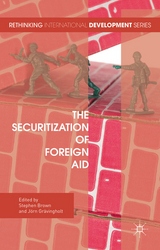
The European Union’s development policy: a balancing act between ‘A more comprehensive approach’ and creeping securitization
Furness, Mark / Stefan GänzleExterne Publikationen (2016)
in: Stephen Brown / Jörn Grävingholt (eds.), The securitization of foreign aid, Houndmills, Basingstoke: Palgrave Macmillan, 138-162
ISBN: 978-1-137-56881-6
Information
Although there is evidence for securitization of EU development policy, and some of the aid spent by the Commission has ‘security’ rather than ‘development’ objectives, we argue that these trends are part of a general effort to progress toward ‘coherence’ across the EU’s external policies rather than the purposeful securitization of development policy and aid. Nonetheless, we acknowledge that the EU’s efforts to improve the complementarity of security and development policy raise the risk that securitization may occur as a consequence, which can sometimes have negative implications for ‘core’ development objectives.

